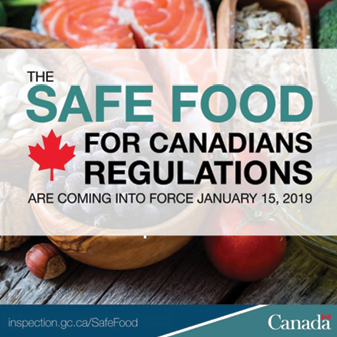
The Safe Food for Canadians Regulations are now in force
Food in Canada
Regulation Food In Canada Fruit & Vegetables CFIA Safe Food for Canadians Regulations SFCRWhat they mean for businesses

Three groups of businesses will be coming under the Safe Food for Canadians Regulations (SFCR) over the coming year, joining others that are already subject to the new requirements.
The three additional groups are businesses with expiring Canadian Food Inspection Agency (CFIA) registrations and import licences, the fresh fruit and vegetables sector and the non-federally registered sector.
The SFCR came into force Jan. 15, 2019, and applies to all foods in Canada. They require food to be prepared with the same level of safety controls, whether it is imported or prepared domestically for export or interprovincial trade.
Sectors affected as of that date include meat, fish, dairy, eggs and processed eggs, processed fruit or vegetable products, maple and honey.

Three main groups will come into force over the next year, based on food commodity, type of activity and business size. They are:
- Businesses with expiring registrations and import licences.
- Some businesses are currently conducting activities under establishment registrations and fish and cheese import licences that CFIA granted prior to the SFCR. Businesses should check these documents for their expiration date, so they can be sure to apply for an SFC licence prior to expiry.
Fresh fruit and vegetable sector
On Jan. 15, 2020, the fresh fruit and vegetable sector will be subject to preventive controls, written Preventive Control Plans (PCP) and traceability requirements. This sector is already subject to the SFCR’s licensing requirements.
Non-federally registered sector
Prior to the SFCR, some food businesses were not registered with CFIA. This sector will come under the new regulations on July 16, 2020, and will include:
- Confectionary
- Snack foods
- Non-alcoholic beverages
- Oils
- Dried herbs and spices
- Nuts and seeds
- Coffee and tea
- Processed grain-based foods such as baked goods, cereals and pasta
New food safety requirements
When businesses become subject to the regulations, they face new food safety requirements around licensing, preventive controls and written PCPs, and traceability.
Businesses need to meet certain conditions in order to obtain an SFC licence. They need to have preventive controls, and in most cases, a PCP that follows the steps set out by the HACCP (Hazard Analysis and Critical Control Point) approach to food safety.
They are also required to keep traceability records. These trace the food one step back to the person who provided the food, and one step forward to the person to whom the business provided the food.
What the SFCR mean for importers
Regardless of the sector, under the SFCR, imported food must be prepared with the same level of food safety controls as food prepared in Canada. Like companies producing food in Canada for interprovincial or export trade, importers are required to have an SFC licence, preventive controls (and in most cases, a written PCP), as well as traceability records.
Before importing food, importers should:
- Understand the food safety risks associated with the food they want to import and ensure there are control measures in place for them;
- understand the supply chain by knowing who is manufacturing, preparing, storing, packaging and labelling the food before it comes to Canada; and
- be able to demonstrate that the food is manufactured, prepared, stored, packaged and labelled in the foreign country under conditions that provide at least the same level of protection as provided by the SFCR.
In addition, importers need to maintain procedures for handling and investigating complaints and recalls for the food they import. The requirements also apply to food that is imported for the purpose of exporting at a later date.
What the SFCR mean for exporters
If a business requires an export certificate or Certificate of Free Sale from CFIA in order to export products, it will need an SFC licence and a PCP.
CFIA publishes the Safe Food for Canadians Licence Registry, which includes all SFC licence holders. Being included on the registry will confirm that businesses are operating in good standing and will help them maintain access to key markets, including the U.S.
Canada and the U.S. have a Food Safety Systems Recognition Arrangement (FSSRA), which recognizes that the two countries have comparable food safety control measures. Canadian food that can be qualified under the U.S. Foreign Supplier Verification Program through the FSSRA includes:
- fruit and vegetables
- shelled eggs
- dairy (except Grade “A” milk and Grade “A” milk products)
- fish (except farmed catfish, catfish products and molluscan shellfish)
- maple
- honey
- processed foods such as snacks, cereals and bakery products.
Getting ready for the SFCR
Whether subject to the SFCR already or over the coming year, businesses of all types are visiting the Canadian Food Inspection Agency (CFIA) website to learn about the SFCR .
As of early June, businesses had used My CFIA to obtain more than 6,000 Safe Food for Canadians (SFC) licences as well as 1,000 Certificates of Free Sale for exporting food to countries that require them.
The CFIA website offers a Toolkit for business, designed to help companies get started in learning about the new regulations.
The Toolkit includes interactive tools and sector-specific timelines to help businesses determine if and when the licensing, preventive control, PCP and traceability requirements apply to them.
Businesses should also:
- read the regulations and guidance material
- enrol in My CFIA after reviewing what information and documents they need for enrollment
- review the information on licensing, including what to consider before applying for a Safe Food for Canadians licence
- begin work on their PCP by consulting the guides for preparing a preventive control plan – for importers and for domestic businesses.
Approach to enforcing the new regulations
CFIA’s enforcement approach emphasizes working with businesses to help them understand the new requirements. The Agency is engaging with businesses and associations to share information about the SFCR and position industry to meet the requirements.
Enforcement actions, where applicable, will be proportionate to the food safety risk and the seriousness of the non-compliance. Factors such as potential or actual harm, compliance history and intent will also be taken into consideration.
Increasing consumer trust
CFIA recognizes that the SFCR will require some businesses to make changes, but there are benefits to doing so. Adapting to the new requirements is an opportunity to instill further confidence and trust in consumers that the food they buy is safe to eat.
Print this page